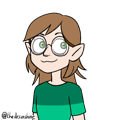Ulf Hundeiker reviewed Der Circle by Dave Eggers
Schon nah dran.
3 stars
Die Struktur ist etwas gewöhnungsbedürftig, so ganz ohne Kapitel, nur Absätze.
Im Prinzip sind wir ja an diesem Szenario schon nahe dran, es ist nur ein wenig weitergesponnen und überspitzt. Ich finde nur, es hätte gerne noch mehr Katastrophen geben können, und das durchaus schon etwas früher.
Die Struktur ist etwas gewöhnungsbedürftig, so ganz ohne Kapitel, nur Absätze.
Im Prinzip sind wir ja an diesem Szenario schon nahe dran, es ist nur ein wenig weitergesponnen und überspitzt. Ich finde nur, es hätte gerne noch mehr Katastrophen geben können, und das durchaus schon etwas früher.












